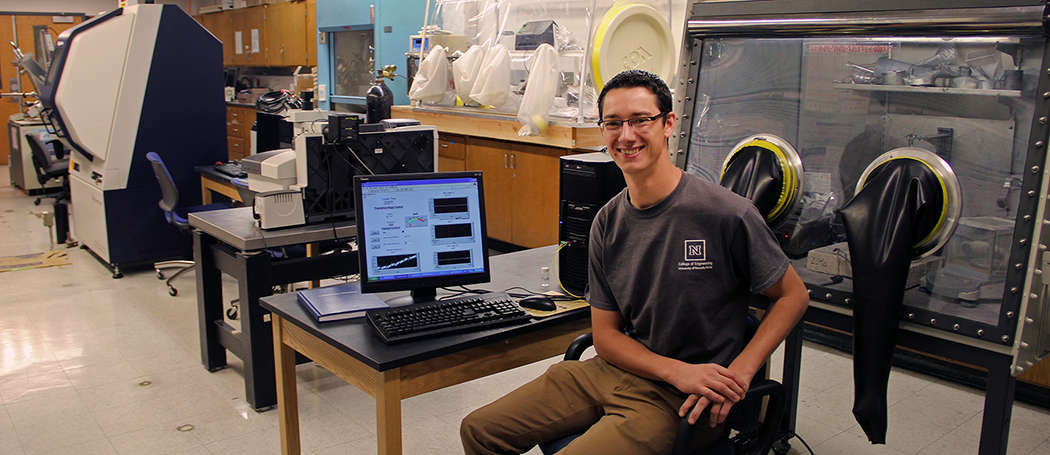Augustus Merwin came to Nevada to snowboard, and he ended up a nuclear scientist.
"I honestly came to Nevada as an undergraduate to snowboard, but I quickly fell in love with nuclear technology while earning my physics degree," the College of Engineering doctoral student said. "After graduating, I thought I would have to leave Reno to pursue a graduate program in the materials aspects of nuclear engineering.
"I was delighted to find similar research being conducted here by my current advisor, Dr. Dev Chidambaram - and I could still snowboard on the weekends. Now I am finishing up my doctorate on a topic that can literally generate clean energy using nuclear waste as fuel."
Merwin's academic achievements, coupled with his productive research and work with student organizations, caused people to take notice; and it led to him being named the University of Nevada, Reno 2015 Regents Scholar graduate student honoree. The Nevada System of Higher Education Board of Regents recognizes an outstanding undergraduate and graduate student scholar annually at each NSHE institution. Awards are based upon distinguished academic accomplishments, leadership ability and service contributions, as well as the recipient's potential for continued success.
Merwin's resume looks like he has been preparing for that honor for the past eight years. He finished his master's degree in Materials Science and Engineering in just one year, he is the founding president of the University's Student Section of the American Nuclear Society, he already passed the professional exam in nuclear engineering, and he is recipient of a prestigious University of Nevada, Reno graduate fellowship funded by the Nuclear Regulatory Commission.
"Gus is very self-motivated and when you see him at work, it is clear that you are seeing a motivated and mature scientist," Chidambaram, associate professor and graduate program director in Materials Science and Engineering, said. "In addition to his academic achievements, he has progressed at an extremely fast rate compared to other graduate students. In fact, he already has seven peer-reviewed publications in international journals and two more under review."
As an undergraduate, he was focused on chemical engineering and renewable energy, while he also enjoyed snowboarding in the Sierra Nevada and sailing his small boat on the many nearby northern Nevada lakes in the summer. Merwin's fascination with nuclear power evolved over his time at the University.
"It was in an alternative energy class that I first fell in love with nuclear, and, ironically, caused me to switch to being a physics major."
As a physics major he learned the difference between what he called a physicist's power plant and an engineer's power plant - one is theoretical and one is not.
"I have little interest in designing theoretical machines; I am much more interested in solving the practical problems associated with building power plants," he said. "The more I learned about advanced nuclear energy systems, the more I realized they are all critically dependent upon the materials that they are built out of. I study materials science applied to advanced nuclear energy systems because construction materials are the limiting factor in the development of these systems."
It's just that combination of applied and theoretical - the combination of physics and engineering - that has prepared him for a career in nuclear science.
"Since the University does not offer a nuclear engineering degree, his background in physics and materials science builds together to give him the subject knowledge," Chidambaram said. "His achievements could be considered as a 'gold standard' for students and professionals at any level. Passing the professional engineering exam is just one example of his talented skill set. Typically, graduate students don't take these exams because they are so rigorous and he took it and passed in a field that's not even his."
The past three years, he has spent much of his time in the MER lab, a chemical and materials engineering lab headed by Chidambaram, bouncing from one end of the lab to the other. The lab, which is stuffed full of processing and analytical equipment, is where he studies and researches to find a method to reprocess used nuclear fuel, specifically the pyroprocessing of nuclear fuel waste.
Merwin spent a good deal of time going back and forth from the lab's glove box, a pressurized chamber to heat molten salts and substances, to the x-ray photoelectron spectrometer and Raman spectroscopy microscope.
"It's a long process," he said.
He uses the specialized equipment to explore the modern reprocessing of used nuclear fuel, specifically material degradation in molten salts related to pyroprocessing. Through pyroprocessing, materials are subjected to high temperatures, typically over 1,500 degrees Fahrenheit, in order to bring about a chemical or physical change. It can eliminate 99 percent of nuclear waste and alleviate much of the concern with used nuclear fuel disposition. Merwin's focus is on the reduction of uranium oxide, a preprocess necessary to integrate current stockpiles of used nuclear fuel into a closed fuel cycle that would generate electricity.
"After years of studying, it became clear to me that the only problem that justifies the public's concerns with nuclear energy is with regard to spent fuel disposition," Merwin said. "As a scientist and an engineer, the concept of burning what people consider 'waste' to produce all the electricity the world could ever consume is absolutely fascinating. By developing the technologies that I am researching now, we can solve the energy crisis while eliminating the public's concern with nuclear energy."
While Merwin has prepared himself to become a professor, he is considering working at a national laboratory.
"I hope to work for either Idaho or Argonne National Laboratories as they both are currently practicing the method of reprocessing used nuclear fuel that I study," he said. "After years of development, it is apparent that the pursuit of pyroprocessing and fast reactor technologies is by far the single best path towards a sustainable energy system for the United States as well as the world."












